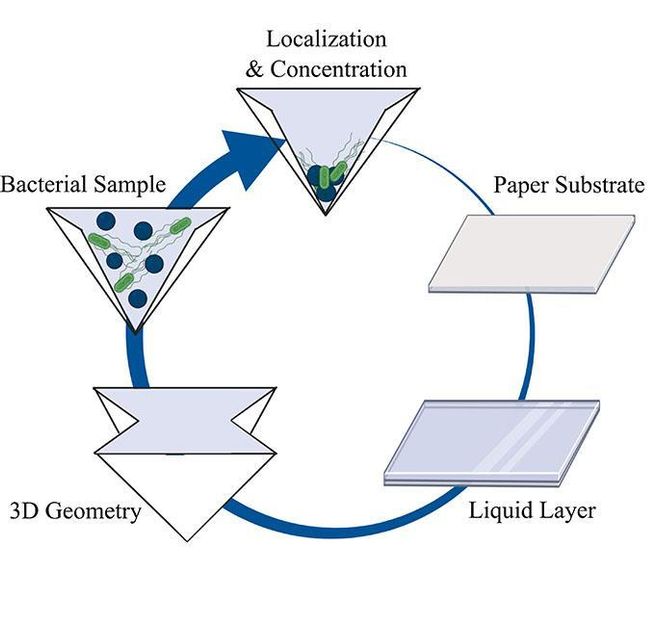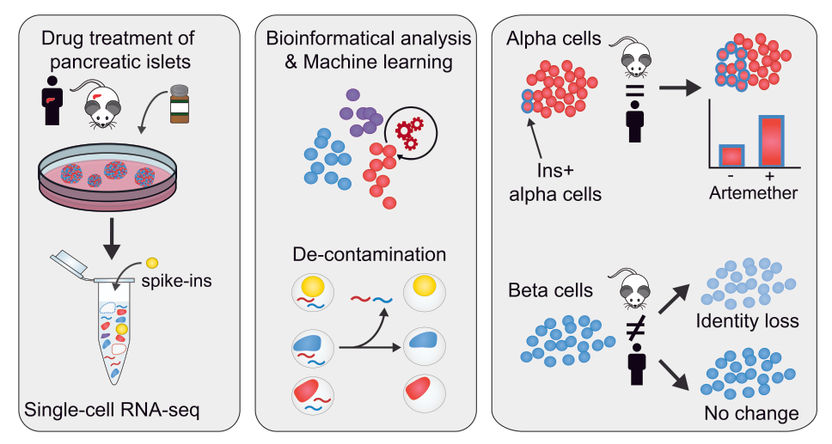Folded paper creates portable lab for field laboratory tests
Monitoring and tracking biological threats or epidemics require the ability to carry out medical and laboratory tests in the field during a disaster or other austere situations. Expensive laboratory equipment is often unavailable in these settings, so inexpensive point-of-care technology is needed.

This image is a achematic detailing the fabrication of liquid-infused polymer surfaces with 3D geometries to localize and concentrate bacterial samples.
Daniel Regan, University of Maine
Ordinary paper is often used in these situations, since it's cheap, portable and widely available. However, paper poses some problems that hinder its usefulness. In a issue of Biointerphases, from AIP Publishing, investigators from the University of Maine report a technique that greatly improves the performance of paper-based point-of-care technologies.
"Paper is a biodegradable resource that can help us address more future challenges than we think," co-author Caitlin Howell said.
In their research, the authors coated low-cost paper with a thin silicone polymer layer infused with a nontoxic silicone liquid and then folded the coated paper into precise geometries, creating vastly improved in-the-field devices for concentrating and testing biological samples. Although folded paper has been used in the past to create low-cost, portable field-testing equipment, it almost always relies on surface tension to move liquid through paper fibers.
Because these fibers vary widely in diameter and length, delivery of inconsistent volumes of fluid to the detector can occur, and losses of up to 50% of the fluid sample into the paper's pores are common. Also, paper pores are small, preventing the flow of large particles, such as blood cells and microbes, which significantly affects the accuracy of tests.
To address these issues, the coated paper creates a slippery overlayer that prevents biological materials, such as bacteria, from permanently sticking to the paper and allows droplets to slide off without leaving traces of fluid behind. It can be folded to create small cups to hold liquid samples.
The coated paper performed much more efficiently and reliably than dry, uncoated paper, regardless of the type of paper used, in terms of both the way the droplets evaporated and the way they easily slid off the paper.
Another test involved samples of live bacteria, E. coli and Staphylococcus aureus, placed into the paper cups and heated to concentrate and culture the samples. Coated paper performed much better than plain paper for E. coli, with nearly triple the number of bacteria in the coated-paper cups as compared to dry cups. Results for S. aureus were not quite as good, however, so further research will be needed.
Original publication
Most read news
Original publication
"Combining the geometry of folded paper with liquid-infused polymer surfaces to concentrate and localize bacterial solutions"; Daniel P. Regan, Chloe Lilly, Abigail Weigang, Liza R. White, Emily J. LeClair, Alexander Collins and Caitlin Howell; Biointerphases; 2019
Organizations
Other news from the department science

Get the life science industry in your inbox
By submitting this form you agree that LUMITOS AG will send you the newsletter(s) selected above by email. Your data will not be passed on to third parties. Your data will be stored and processed in accordance with our data protection regulations. LUMITOS may contact you by email for the purpose of advertising or market and opinion surveys. You can revoke your consent at any time without giving reasons to LUMITOS AG, Ernst-Augustin-Str. 2, 12489 Berlin, Germany or by e-mail at revoke@lumitos.com with effect for the future. In addition, each email contains a link to unsubscribe from the corresponding newsletter.
Most read news
More news from our other portals
Last viewed contents
Catechin
Arpida re-aligns activities to support transition of its research portfolio
Spanish_flu_research
Fluid Metering has rolled-out its new expanded website
Acetylcysteine
Theophylline
Hyponastic_response
The_Language_of_the_Genes

How the brain builds panoramic memory - Neuroscientists identify brain regions key to linking different views of our surroundings.




















































